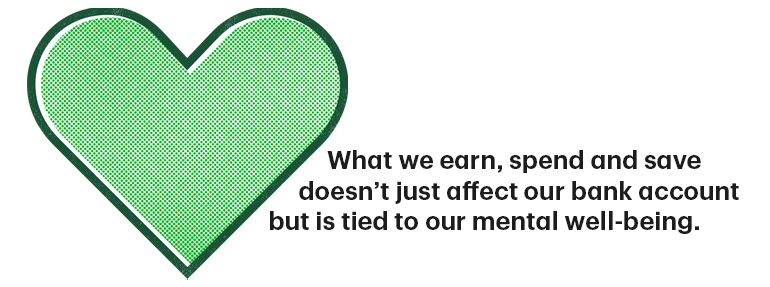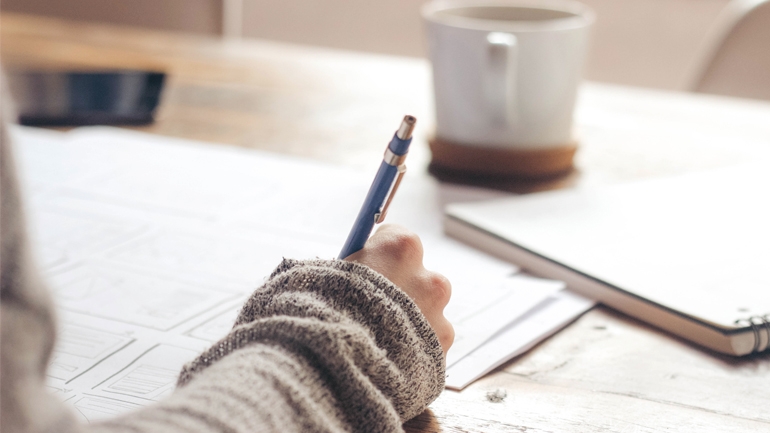We all have sources of stress or anxiety in our day-to-day life, and the outbreak of the coronavirus that causes COVID-19 has only added to these feelings and pressures.
Before COVID-19, Canadians often pointed to money as their greatest source of stress, with research by the Financial Planning Standards Council in 2018 showing that more than 48 per cent of Canadians said they’ve lost sleep due to stress over debt, managing household costs, saving for goals, and unexpected expenses.
Their research shows that what we earn, spend and save doesn't just affect our bank account but is tied to our mental well-being. This is especially true now.
TD is working with the Toronto-based Centre for Addiction and Mental Health (CAMH) to share information on mental wellness and the relationship between financial and mental well-being.
For many of us, our thoughts can play a major role in influencing how we feel and what we believe to be true, at the same time affecting our ability to cope, regardless of what's happening in our lives.
According to Dr. Donna Ferguson, Psychologist at CAMH, the thoughts we have can sometimes be so strong and so ingrained that we can believe them to be true, even when they’re not. That's why it can be helpful to challenge our thoughts as we work towards feeling better.
Below, Ferguson offers some advice on ways to cope with anxiety and stress that are often shared by researchers at CAMH:
Start with catching your thoughts.
Ferguson says when you are feeling anxious or stressed, stop and write down what you are thinking. This helps get the thought out of your body. There may be more than one thought going through your mind when feeling anxious. For example, your thought might sound something like “What if…X happens," or, "I'm worried that X …”
"Once you have identified the worry (ies) or thought(s), challenge it," she said.
Ferguson recommends stopping and asking yourself the following questions: Is this thought true? How do I know it’s true? What is the evidence to support this could happen? And is there any evidence (facts) that could support that it won't?
Then, ask yourself if the concern you have has ever happened before, and if it did, ask yourself how you coped. What was the end result?

Ask yourself, “What does worrying do for me?
If you still find it hard to stop worrying after asking and responding to the above questions, Ferguson recommends asking yourself whether worrying is helping you solve a problem, or if it is keeping you stuck and feeling anxious. Another question to ask yourself at this time is whether it is helpful to keep thinking this way?
After performing these exercises, can you identify a more balanced thought?
After working through these approaches, Ferguson recommends that you then try to see if you can articulate a more balanced thought.
For example, the thought: “So many people are losing their jobs and source of income, I'm going to lose my job and won't be able to support myself or my family,” could be replaced with, “I have work now and I am doing everything I can to cut back on expenses and, if I do lose my job, there are financial relief programs available to help. I also have a good support network."
This exercise in identifying worries, listing the evidence to support that it might come true as well as the evidence to support that it may not turn out that way, is recommended for any anxiety overtaking our minds, she said.
"These long-held beliefs can be especially true about money," Ferguson said.
"While many people put off dealing with these financial concerns and fears over facing them, it's best to get your financial concerns on paper and map out a strategy to deal with them, including researching the programs for relief you may be eligible for. Budgeting is going to be very important at this time and being able to feel like you have some control over a difficult situation is often helpful to relieve anxiety and overall stress.”
"Creating a new or updated budget while listing current expenses – along with non-discretionary ones to reduce spending where possible – is an action you can take to help deal with the worries that come from financial concerns," Ferguson said.
There are also financial relief programs being offered by the Government of Canada and the provinces that are available to help Canadians impacted financially at this time. Click here for more information about the Government of Canada's financial support programs.
For more information on how TD is helping customers, please visit the TD Newsroom or td.com/COVID19 to learn more.
Ferguson also advises that it's best to focus on what you can control.
“There are a lot of simple things you can do at home to keep your mental health in check," she said.
"Applying mindfulness tactics such as catching your thoughts can help you manage your anxiety. Eating healthier foods, staying physically active (even moderately so while at home), practicing proper sleep hygiene and connecting with loved ones are also vitally important during stressful times.”
For more information on how you can help manage your mental health during these uncertain times, visit CAMH’s COVID-19 resource page at www.camh.ca/covid19.
In 2019, TD announced a donation of more than $20 million to CAMH through the TD Ready Commitment, which will be applied to fuel research discoveries, contribute to care programs, and to help break down stigmas surrounding mental illness and addiction.
